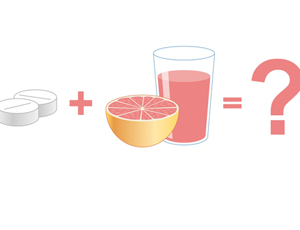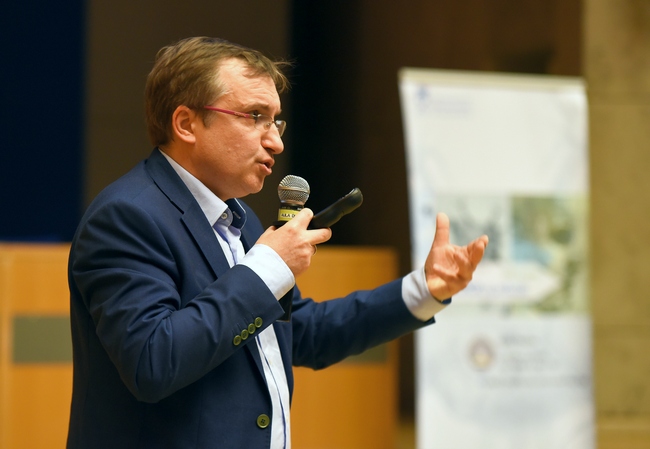
The development of modern medicine grants us access to an ever-increasing supply of various drugs. New medicines, though gradually more effective, carry the risk of negative side effects. Now more than ever, it’s crucial to take medicine based on reliable information.
On 11 April, a meeting was organised at the JU Auditorium Maximum, aiming to educated the people of Kraków on medicine safety and the interactions between drugs and foods. Two specialists from the JU MC Faculty of Pharmacy, Dr hab. Jacek Sapa, Prof. UJ and Dr Paweł Paśko, delivered lectures on these topics to increase Kraków inhabitants’ awareness about the dos and don’ts of medicine use.
The event started with Prof. Sapa’s presentation on drug safety. He spoke about popular myths surrounding drugs, the limitations of clinical trials, the importance of informed medicine use, and the responsibility of doctors and pharmacists to educate their patients. He emphasised that side effects are an integral part of any drug – some are caused by the drugs themselves, others by specific properties of patients’ organisms.
There’s no snake oil
Every effective drug, including those that can be bought without prescription, has some side effects. If a producer claims that their medicine doesn’t cause any, it’s safe to assume that it has no healing properties either. Pharmaceuticals owe their effectiveness to active substances that have certain effects – and these effects are very much related to their dosage, which means that while one pill may help, ten may cause serious harm. Sometimes ingesting a dose much larger than suggested can lead to consequences a lot more severe than temporary discomfort. For instance, an overdose of paracetamol may lead to acute liver failure with a fatality rate of 28%!
 There are many types of negative side effects. They can be caused by overdose, prolonged use, or allergies; some are observable after a period of time, others almost immediately. Some of those may not even be listed by the medicine’s producer: even the most rigorous clinical trials aren’t always completely conclusive, and some side effects are extremely rare and difficult to simulate. The situation gets even more complicated when several drugs are being taken simultaneously, which is a common problem for the chronically ill. In such cases, it’s best to consult with a doctor first. Nevertheless, responsible use of medicine usually guarantees that positive effects will outweigh any negative ones. Informed self-medication also entails careful verification of any sensational rumours about catastrophic side effects of drugs.
There are many types of negative side effects. They can be caused by overdose, prolonged use, or allergies; some are observable after a period of time, others almost immediately. Some of those may not even be listed by the medicine’s producer: even the most rigorous clinical trials aren’t always completely conclusive, and some side effects are extremely rare and difficult to simulate. The situation gets even more complicated when several drugs are being taken simultaneously, which is a common problem for the chronically ill. In such cases, it’s best to consult with a doctor first. Nevertheless, responsible use of medicine usually guarantees that positive effects will outweigh any negative ones. Informed self-medication also entails careful verification of any sensational rumours about catastrophic side effects of drugs.
At the end of his lecture, Prof. Sapa mentioned an important concept related to medicine safety: pharmacovigilance. Institutions such as the Polish Office for Registration of Medicinal Products, Medical Devices and Biocidal Products are constantly on watch for any information on potential negative side effects of all drugs based on the information from medical centres and patients.
Wash it down with water
In the following presentation, Dr Paweł Paśko continued with the subject of safe medicine by explaining the interactions between drugs and foods. He enumerated a list of products that could reduce medicine absorption, increase its toxicity or side effects, or simply stop it from working.
Dairy products can considerably reduce drug absorption: calcium ions contained within them can reduce the effectiveness of antibiotics due to complexation.
The sheer number of drugs available today makes it hard to formulate any definite, universal rules for taking medicine with certain kinds of food – therefore, it’s important to talk it over with a specialist first. However, there is one golden rule applicable to beverages: all drugs can be safely washed down with water.
Dr Paśko talked extensively about what kind of effects can food have on medicine. Dairy products can considerably reduce drug absorption: calcium ions contained within them can reduce the effectiveness of antibiotics due to complexation. Fibre can also influence the absorption of active substances. Dr Paśko recollected the case of a man who was suffering from depression, and who was taking doxepin to combat it. After he went on a fibre-rich diet to lose some weight, his depression promptly returned. It turned out that because of the diet, the concentration of the anti-depressant in his body has fallen to 50%. Even grapefruit juice can affect medicine – it disturbs the intestinal enzymes, increasing the risk of drug toxicity. This has led many hospitals to outright ban grapefruits from their shops and cafeterias.
At the end of the meeting, both lecturers participated in a Q&A session. As there were a lot of questions, not all of them could be properly answered in the assigned time limit. The conclusion, however, was that in general it is important to use drugs responsibly based on opinions given by experts. Informed decision-making is our greatest ally when treating ourselves.
Original text: www.nauka.uj.edu.pl





